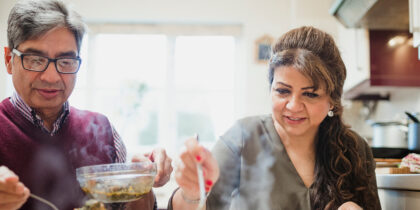Shuranjeet Singh, founder of Taraki, joins Thea to talk about how his organisation is working with Punjabi communities to reshape approaches to mental health. We discuss what led him to create the organisation, the role of faith centres, and the need for an intersectional approach to mental health inequalities. Shuranjeet reflects on the barriers to accessing mental health support, and the need for health services to engage the communities they seek to serve.
Listen to the episode on Spotify or iTunes. The full transcript is available below.
Show notes:
- Visit Taraki’s website
- Taraki’s research on Covid
- Check out Shuranjeet’s blog for us
- Learn more about our Commission for Equality in Mental Health
Music by scottholmesmusic.com
Transcript
Alethea Joshi (AJ): Hello and welcome to Centre for Mental Health’s podcast, where we explore ideas around mental health, equality, and social justice. I’m Thea Joshi, and in each episode of the podcast we talk to people with lived experience, those working in a specific area of mental health, or some of our own team, to share how we’re working in the fight for equality in mental health. A few weeks back, I caught up with Shuranjeet Singh, the founder of Taraki, an organisation working with Punjabi communities to reshape approaches to mental health. The work Shuranjeet and Taraki are doing is really amazing, and it was great to hear more about his experience and observations, and the barriers which can prevent Punjabi communities in accessing mental health care. Hope you enjoy.
AJ: So I’m here today with Shuranjeet Singh, who is the founder of Taraki. Welcome, Shuranjeet.
Shuranjeet Singh (SS): Thank you very much for having me.
AJ: I am really excited to have this conversation to learn more about what you do and what you’re doing with Taraki. We did some work together last year for the Commission for Equality, and you wrote a blog for us, but I really am really wanting to learn more about what you’re doing specifically in the Punjabi community. So yeah, just I’m gonna dive right in. So you’re the founder of Taraki. So it’s working with Punjabi communities around mental health. But can you tell us a bit more about the purpose of the organisation and what you guys are doing and what you’re working on? I’d love to hear more.
SS: Absolutely. So I started Taraki in October 2017. Following and it’s informed by my experiences and mental health challenges. You know, when I was transitioning from home, which for me is Birmingham, and, you know, going out to the city to start my undergrad. I was very lucky, you know, eventually, after a couple of years to access support for the challenges I was experiencing from my housemates, and a space to talk openly, a space to learn off each other, a space to really just reflect, positively reflect on some of the challenges we might be experiencing and support each other through that fundamentally. And it was around that time that I was looking at folks in the communities I grew up in. And I recognised that there were people experiencing difficulties, but they weren’t as lucky as I was to access that type of support. And so what Taraki wants to work towards is a community, a Punjabi community, which is more confident and comfortable and capable of supporting themselves, supporting one another with regards to their mental health, and you know, their lives more generally.
And so we started Taraki in October 2017. We work with Punjabi communities to reshape approaches to mental health. And at the moment, our work is split into four areas. We have our awareness work, our education work, social supports, and then research. I can kind of give you a bit of a rationale behind these strands as well. So when we started in October 2017, one of the reasons we started was because I was having a lot of conversations with folks about mental health in my communities, and they would say, “eh goreyah di cheez aa”, which means I’d say “it’s a white person’s thing”. And reflecting on that, I didn’t necessarily, you know, blame them as individuals. But what I did was I recognised that the conversations that were happening in society more broadly, especially around men’s mental health, were not representative of the communities that make up our society. And so we wanted to really just kind of cover that gap initially. And so we started doing a lot of work around mental health awareness, particularly men’s mental health awareness. And slowly, slowly, we recognise that awareness is good, it’s the first part of the process, but awareness without follow up is not actually, you know, developing support infrastructure, it’s not actually taking us further in that conversation.
And so we were looking at our awareness work, which was, you know, campaigns on social media, going out to faith centres and doing talks, making videos, you know, going to universities and doing talks. And we were actually thinking, ‘okay, how do we take that next step?’, because, you know, I can look up at the sky, and I can see an aeroplane flying. And I’m aware that, you know, aeroplanes fly in the sky, but I could not tell you anything about how that happens. Or I could maybe try, but it’s not going to be right. And so for us, it was really important to take that next step, after awareness. And for us that was around education. And so it was actually developing the skills to be able to approach these conversations and these topics with more comfort and more confidence. And so what we did was actually develop a number of different workshops that we would deliver within faith centres, with students, and actually start developing our knowledge so we can take that next step in this process. And so we were looking and we had awareness and education, okay, that’s cool. But we didn’t have places to apply these learnings.
And so then we were looking at, okay, we’ve got the awareness piece, which is the first step. We’ve got the education stuff, which builds on that, you’re kind of building a bit of a foundation. But we haven’t got somewhere to apply those skills. And so we really started focusing on our social support work, which is essentially peer support within Punjabi communities. And it’s places where people can actually offer that type of space for people to talk openly, talk honestly, and learn about wellbeing and mental health and in different ways and connect with other individuals on that journey as well. And so that actually looks like we have space for Punjabi men, which, you know, pre pandemic was meeting every month in person and in Birmingham and London. Obviously, during the pandemic, it’s all been online. We had a, we have a space for Punjabi women, which also met monthly in Birmingham in London, but it’s now all online. A space for Punjabi LGBTQ+ folks, which was in person in Birmingham and London and now online. And then more recently, kind of spaces to students as well, for Punjabi students.
So you know, it’s this three-prong process, they kind of like interlink to each other, and then finally, you have the research piece, which really helps to inform all of that. It helps to ask some more reflective questions about why we’re doing what we’re doing. What are the gaps that we aren’t covering? What are the approaches that we need to take? And in reality, it tries to, it tries to neaten up and focus the work that we do. So as I mentioned, awareness, education, social support, and research is all, we’ve tried to make it all very intentional. But yeah.
AJ: That sounds genuinely amazing. I’m so excited that that kind of work is going on, the work in the community, the peer support. Yeah, what are you seeing as a result of that?
SS: So even just if we’re thinking about the awareness work, you know, when we were sharing testimonials and experiences of Punjabi men around mental health challenges, when we only had one or two out there, it was really hard to get people to have that conversation. But slowly, slowly, more and more people would come forward and share and it was almost like a bit of a snowball effect, where more and more people would come. And suddenly, there was a sense of it being okay to talk about some of these difficulties. And so for us, you know, there has been a real challenge to the kind of cloak of silence, on these questions, you know, really just putting these discussions front and centre and being okay to talk about.
But importantly, you know, we’re not just stopping at that awareness, as I mentioned before, we’re trying to actually develop that into education, and work with organisations so that they can take the steps to actually support their communities the best as well. And so, you know, putting mental health on the agenda of a lot of other community based organisations, you know, faith based organisations, for us, that’s been incredibly, incredibly important. And because of the work we’ve been doing, we’ve been able to advocate for this item to be more and more on the agenda within these different spaces. And so you know, places of faith, you know, making sure that they know that mental health is something that they need to be talking about, they need to be organising around, they need to be focusing on because they’re responsible for this type of support. And then when it comes to our social support work, you know, we’ve seen men, women, Punjabi LGBTQ+ folks, students have and develop really, really unique relationships with the spaces that we run. You know, we have folks who have attended as participants who now help out as facilitators, folks who attend, you know, might sit there and listen for a few sessions, but then in one session might feel comfortable enough to kind of speak openly, and then being received with such warmth, with such compassion, that for me, it’s a very unique space where there’s a real sense of peer support, there’s a real sense of mutual uplifting one another and taking those steps forward together.
AJ: Thank you for just explaining a little bit more about what that looks like. And so you mentioned that Taraki is also working specifically with faith communities. And I just wanted to know a little bit more about that, how it’s been for you guys, what you feel the role of faith organisations and faith communities is. I’d love to hear more about that.
SS: Absolutely. And, you know, for me, personally, this strand of work is incredibly important. My, kind of, my relationship to Sikhi, the Sikh faith, is something that has been with me throughout my life, whether up front, or kind of in behind. And I remember just, you know, anecdotally, I remember going to my parents once, when I was a teenager, and talking to them about mindfulness, and they looked at me and they laughed, and they said, “we’ve been doing that with you since you were born”. And that, for me, made me really understand and recognise that there are these things obviously happening in different contexts. And it’s important that we understand that this knowledge exists in different forms, across communities who may previously have been pushed away for that kind of knowledge as well.
And so faith is something that’s been important in just how we are approaching mental health through Taraki. And so when we did our COVID research last year, we were asking people to understand if they’d experienced mental health challenges, what kind of challenges they’d experienced, but importantly, we were also asking people what kind of support had they used at this time. And 40% of respondents said that they had used faith, contemplation, meditation, as ways of supporting themselves. And that, you know, spanned a number of different faiths. But importantly, it said that faith was something that was important. And so we started working with, we’re focusing on two Sikh educational organisations, to bring together faith based conversations and kind of psychological knowledge around mental health, to actually provide workshops, discussion, talks, seminars, on these topics, you know, that intersection between faith and mental health.
And you know, what we found from that, we have an insight report or a programme evaluation that’s coming out, hopefully, by the end of the calendar year, what we found from that is such a, you know, such a high percentage of folks who are attending these, we were getting hundreds of people attending each of these sessions, such a high percentage of folks, you know, over 50% of folks identified as having experienced mental health challenges during COVID-19 pandemic. And then when we said to folks, “have you accessed support through health care?”, 60% said no. So there’s that level of, that real number of folks who’ve experienced mental health challenges, but a lot of them hadn’t actually accessed support. And then we also asked them, “do you know where to access support?” And 75% said yes. So these very interesting potential relationships there, which really made it so important to think about people not accessing support are still here in this session that’s on mental health and faith. And so we really, really want to understand that a bit more. There’s a lot to understand and a lot to unpack, because, you know, any kind of community based approach to mental health, will consider the relationship between their communities and different kinds of faith system.
AJ: Yeah, I think that’s really important. And it’s something that I am very much in favour of, and having those conversations about faith and mental health. And it is so critical, isn’t it, especially for people who are part of faith communities, that their emotional, psychological wellbeing will be so interlinked, I would say, with their spirituality, with their faith. But it was so interesting what you were saying about the kind of disparity between the number of people who’d experienced some sort of mental health, emotional difficulty during the pandemic, and the sort of levels of help seeking or lack thereof. I mean, what would you say are the main barriers? As you said, it’s very complex, and you’re still researching into it. But, you know, at the moment, what would you say the main barriers?
SS: I would say the barriers are a mixture between, you know, I think everyone talks about stigma. Stigma is a big conversation that folks have a lot, and we can’t say that stigma does exist, because there is a level of stigma within, you know, across communities. But it’s also important to think about the experiences of these communities when they’ve accessed health care services before, you know, when they’ve accessed other services, which might be perceived as proximate health care services, you know, government led services, public services, all these different kinds of things, their experiences of that type of authority, or that type of power, will undoubtedly impact their likelihood to then engage with similar structures of power, to access support for their wellbeing.
And so for me, there is a complex mix of where folks are, where the kind of trust of communities is invested. You know, where that trust sits, and I think faith based institutions, faith organisations, faith communities, there is a lot of trust there. There’s a lot of trust, especially in comparison with other kinds of services. And so it’s really important to look at that and understand that we actually, instead of lying to ourselves thinking that we can build absolute trust with everybody within health care services. We need to really be aware of where folks have that trust already, and how we can work with these organisations, these spaces, to build and enhance their capacity to support their communities fundamentally. Because otherwise, you’ll carry on in this situation where you will make and continue to build services and services and services within formal health care systems. And people will continue to support faith based organisations, will continue to be a part of faith based communities and will still not access support from health care infrastructure when they’re going through their difficulties and will still go to faith based communities when they want that support.
So we really need to ask ourselves these deep questions about, do we want to support folks where they are? Or do we want people to only access support if they’re coming into our building? Or if they’re coming into our service?
AJ: Yeah, the stigma conversation is an interesting one, isn’t it? Because it can just be sort of using stereotype like, oh, you know, but then when you as you say, you know, being seen as a white person’s problem, it’s just, yeah, fascinating.
SS: This is it, and it’s, you know, we can talk about the stigma, we can also talk about, like systemic injustice as well. These are conversations that are interlinked, rather than completely separate.
AJ: I thought the trust thing was really interesting about the trust in faith communities, and I guess potentially the sort of contrast with the mistrust.
SS: My theory is that like, essentially, there is increased distrust in health care services that are perceived as proximate to the state, by communities who have experienced harm and injustice at the hands of that state. The future of this, in my mind, is neighbourhood level networks, knowledge networks, doing networks, kind of thinking and doing networks, which can ask these questions, and which can help inform hyper localised decisions about what services could look like, what services are required, and how they can sit across more, you know, formalised clinical health care spaces versus community based care.
And it’s understanding, you know, faith based communities, we know they’re not homogenous. There might be some faith based communities that have a physical space where they can hold discussions or workshops, there might be others who have a lot more infrastructure, there’ll be others who have a lot of less infrastructure. And within those communities, within these congregations, there might be some folks who have a lot of very kind of very specialised and specific skill sets. There might be other congregations where the skill sets are different. And so it’s really taking a strengths based approach to how we understand our faith based communities, and how they can potentially support with that mental health conversation at a really localised level.
AJ: I love that vision, which I guess leads me on to ask, what does need to happen across kind of “mainstream”, say NHS or local authority mental health services to actually reach Punjabi communities and improve mental health in Punjabi communities, what’s the role there?
SS: For me, that role is very much linked into, it’s about embedding those with this expertise further up the river, rather than it just being, hey, we’ve developed this, we’ve got a community mental health team here available now. If you want to access this, you can call this number or we have these free, you know, CBT based interventions available here, contact us for this, self-refer this way. We need to be up that stream where those decisions are being made earlier in that process, rather than just objects of dissemination. And so it’s important that we are firstly kind of in those decision making, or at least have a seat at that table in the decision making role.
And then I would also say, we need to actually be involved with the research that’s happening into these topics, because otherwise, folks will ask us the same questions and the same paradigms and, you know, come to very similar responses. And that will just kind of sit on a website gathering digital dust type thing. But for me, it’s about identifying, working with communities to think, what skills do folks have, what strengths are there, and where can we actually share and build these skills in an equitable way? Because, you know, it’s not just, and I kind of reflect on what I just said, it’s not just about sitting at the table, but it’s do people have the tools to succeed when they’re at that table? And so for me, these things are built over time. These relationships are built over time.
And so for more formal health care services, you know, NHS, that kind of thing, it’s about actively engaging and sitting alongside these communities, bringing them together, working across different communities, creating communities of knowledge as well within that, so that we can be specific, we can share those experiences more widely as well. Like we don’t want to forego having a narrow focus and just, you know, making that generalised because then you just fall into the same trap all over again.
AJ: Yeah, that’s so vital, isn’t it. And I’m really struck by the parallels between what you were saying there, and our last podcast, speaking [with] one of our peer researchers. It’s that same thing about (a) having a place at the table, and (b) genuinely being listened to, because otherwise we will keep doing the same things. And that’s a conversation we’ve had again and again, about the need for sort of actual, genuine coproduction, that is actually creating services alongside communities and from those communities, and just how vital that is. I mean, it’s laughable when you think about it, that we could, you know, the NHS, anyone, could ever provide services for communities without working with those communities. There’s so much, I guess, just white washing? I don’t know. Yeah, it’s crazy when you start thinking about it.
SS: And it’s really opening, it’s opening kind of access to these spaces that were previously incredibly exclusive. You know, service development, also knowledge formation. Like, this for me is one of the key parts of this conversation, because those who make knowledge in our society are largely from particular backgrounds, they’re largely from particular experiences. And I’ve seen this, right? You know, if my parents said to me, you know, you can come and sit and do your prayers and do your paath and it’ll make you feel good on the inside. That’s me listening to them. It’s different than me saying, hey, mindfulness is a great way to connect with yourself, like, you know, plastered over the internet. And for me, there are those processes of knowledge making, which are incredibly exclusive. And these are spaces that are guiding what is and what isn’t possible. And so even before that step, when we think about services, if we’re thinking about services, services are informed by particular understandings of what is and what isn’t required. And so even taking that step back, and having folks and communities involved with knowledge making literally structures how we see the world around us.
AJ: Yes, 100%. And I am really excited that this is work that Taraki is doing, because as you say, it’s critical and I don’t know how you can create anything helpful, effective without it. But I mean, we’ve kind of started to talk around this, but I’d love to know a bit more about you know, how are you seeing inequalities in mental health playing out in the people that Taraki is working with?
SS: Absolutely. And I think it’s important whenever we have any conversation around inequalities, that we’re reflective on where our limitations are. I think, we’re not going to sit here and talk about how we are attentive and responsive to absolutely every need within Punjabi communities. But we can be intentional and say, this is what we’re doing, this is what we’ve identified, and this is the work that we still need to do. You know, two little things that stick out into my mind around inequalities, which are very, very practical and pragmatic things.
The first was, we changed our tagline twice, right? For Taraki. When we started the Taraki tagline was “Taraki wants to reshape how the Punjabi community approaches mental health”. The first thing we changed was actually thinking about who the locus of change is. So actually, it changed to “Taraki wants to work with the Punjabi community to reshape approaches to mental health”. You know, understanding us as a facilitator, us as a connector and the communities that we’re working with as the ones who are really instigating that change. And the second change we made which I think is the most integral change that has ever happened in our organisation was that we moved from talking about the Punjabi community to Punjabi communities and integrally that opened a whole host of understanding around those folks who we might be engaging with and those folks who we might be intentionally or unintentionally excluding from that conversation.
And so constantly when I’m thinking about our work, I’m thinking about how we support Punjabi communities. But then how there are some folks in that who we aren’t actually supporting very well. And so for us what that has led to, it’s led to us being very intentionally intersectional about our approaches to research, our approaches to our services. And this is seen mainly through our work with Punjabi LGBTQ+ communities, where we have worked alongside organisations in that space, because we’ve identified a need that a lot of other groups weren’t covering. We’ve identified a subsection of Punjabi communities that are often excluded from this conversation and services. And we’ve actually slowly started working to offer those kinds of services led by Punjabi LGBTQ+ folks.
And so inequalities in these types of identities and marginalised identities and multiply marginalised identities are at the heart of what we do. You know, a lot of our work is all in English, that’s already incredibly exclusive to folks who only speak Punjabi. A lot of our work, a lot of you know, to hear about us and our work, you have to basically be online, which is already very exclusive for folks who haven’t got access to those types of means. But I know that these are limitations of what we do. And I know that these are things that we want to amend and work towards resolving in the future.
But the main inequalities that we’ve been trying to focus on and work on are the experiences of Punjabi LGBTQ+ communities, and now slowly starting to think a bit more about experiences of Punjabi disabled communities as well. And within this, these are big projects, these are big projects, because these take a lot of time, a lot of reflection to put things together, and work with those who actually have the expert knowledge and experience of these communities. And, you know, thinking about Taraki’s role as a facilitator in those conversations. And I just think that we can always talk a lot about the inequalities that we focus on within externally, that we want to kind of combat but also within that it’s so important to be inwardly reflective. And think about we might be doing this work, but we also have limitations, which is fine, because everyone has limitations, but at least be recognising and intentional about resolving them as we move forward.
AJ: Yeah, thank you. I really appreciate that, yeah, that internal reflection and that humility, because as you say, like, no organisation can do everything. But I think I’m really pleased to hear about what you’re doing in terms of recognising yeah, there’s intersectional inequalities. And as you say, there’s multiple upon multiple disadvantages. And I think, again, it just hammers home that point that we cannot see any community or any one lens of inequality by itself, or one community as a homogenous group. I think too often both research and policy and services, if they see that diversity of need, it’s on a very sort of single lens, isn’t it? There’s very little place sometimes for intersectionality. And so we have to have that at the core of both our work as a research and a campaigning organisation, and it has to be at the heart of any work to kind of really challenge mental health inequalities. We’re only going to see actual change and actual eradication of mental health inequalities, if we are taking an intersectional approach.
SS: And within that, you know, I remember at the beginning when we started Taraki, folks said to me, why don’t you make a mental health initiative for everyone? Why don’t you make it for South Asian communities? Or why don’t you make it for Black and Minority Ethnic communities? My comment was, you know, how will we ever do justice to those who are living at the intersections of multiple marginalised identities, if we are trying to cover an unimaginably large amount of ground? You know, we would end up going really, really wide, but not very deep at all. And so, you know, a year two years into doing this work with Punjabi communities, for me, it’s unfathomable to be able to juggle that level of intersectional depth with the breadth that other folks are suggesting to us at the beginning. And I’m so grateful that we had a narrow focus, because it’s allowed us to dig in in a lot more of a deeper way than a lot of other organisations do. And it’s not to say that every organisation needs to dig in in that way, but we need folks who are covering different bases. We need folks who are able to kind of pull these conversations together across communities. We need folks who can go in into particular communities and really try and understand the nuances of those experiences. And so for me, I’m just glad that we were mega stubborn.
AJ: Absolutely, absolutely. I think it’s so brilliant that you are doing something as you say with that depth. And I think as you say, you know, there’s a space for breadth, but you would have by necessity missed out so much of that depth if you had to be broader with it. And as you say, as we’ve been discussing these multiple intersections of identity, they need to be looked at, they need to be heard, you know, to really create anything good.
Look, Shuranjeet, it’s been so wonderful speaking to you and I know I say this every time but I actually could have spoken to you for at least double the time. I have so many more questions for you. But thank you so much for coming on our podcast and we really wish you guys at Taraki all the best. It’s been a joy to hear what you guys are doing and we are really right behind you in that.
SS: Much appreciated. Thank you so much for inviting us on.
AJ: As ever, we really hope you enjoyed the episode. If you have, please consider donating to us at www.centreformentalhealth.org.uk/donate – your donations help us continue fighting for equality in mental health. See you next time.












